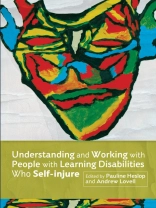Adopting a predominantly psychological approach, this book provides carers with up-to-date information and resources to provide appropriately individualised care to people with learning disabilities who self-injure.
Understanding and Working with People with Learning Disabilities who Self-Injure synthesises traditional (behavioural) and newer (psychological) approaches to understanding self-injury, drawing on psychoanalytic and social theory to provide practical guidelines for more sustained and effective support. It suggests that motivations for self-injury may be similar for people with and without learning disabilities, and draws on case work examples to suggest person-centred techniques that encourage communication – particularly important with people who do not use verbal communication – and recovery. The book covers a range of specific needs, including people with autism who self-injure, and emphasises the views of people with learning disabilities themselves and their families about what has worked best, and why. At the end of each chapter, a variety of practical implications for the provision of support are given.
This book is for those supporting people with learning disabilities who self-injure and will be a useful resource for social workers, psychologists, counsellors, learning support workers, nurses and social and health care students.
Table des matières
Acknowledgements. 1. Introduction. Andrew Lovell, University of Chester, UK and Pauline Heslop, University of Bristol, UK. Part 1. 2. Dimensions of Self-injury. Andrew Lovell and Pauline Heslop. 3. Social Approaches to Understanding Self-injury. Pauline Heslop. 4. Psychoanalytic Approaches to Understanding Self-injury. Pauline Heslop and Richard Curen, Respond, UK. 5. The Voice of Experience: People with Learning Disabilities and their Families Talking About How They Understand Self-injury. Pauline Heslop and Fiona Macauley, Bristol Crisis Service for Women, Bristol, UK. Part 2. 6. Minimising Harm. Helen Duperouzel and Rebecca Fish, Calderstones NHS Trust, UK. 7. What People with Learning Disabilities Say Helps Them. Pauline Heslop and Fiona Macaulay. 8. Family Voices. Andrew Lovell. 9. Psychoanalytical Approaches in Practice I. Valerie Sinason, Clinic for Dissociative Studies, UK. 10. Psychoanalytical Approaches in Practice II. Noelle Blackman, Respond, UK and Richard Curen. 11. Self-injury and Loss of Sense of Self. Phoebe Caldwell, Intensive Interaction practitioner. 12. A Relational Approach to Understanding Our Responses to Self-injury. Gloria Babiker, University of Bath, UK. 13. Conclusion. Pauline Heslop and Andrew Lovell. References. Contributors. Index.












